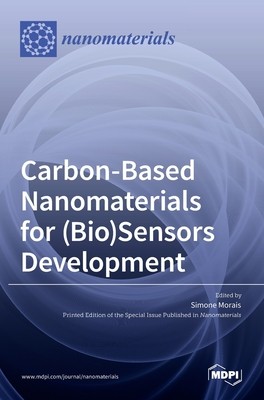
- We will send in 10–14 business days.
- Publisher: MDPI AG
- Year: 2021
- Pages: 234
- ISBN-10: 3036526064
- ISBN-13: 9783036526065
- Format: 17 x 24.4 x 1.9 cm, hardcover
- Language: English
- SAVE -10% with code: EXTRA
Carbon-Based Nanomaterials for (Bio)Sensors Development (e-book) (used book) | bookbook.eu
Reviews
Description
Carbon-based nanomaterials have been increasingly used in sensors and biosensors design due to their advantageous intrinsic properties, which include, but are not limited to, high electrical and thermal conductivity, chemical stability, optical properties, large specific surface, biocompatibility, and easy functionalization. The most commonly applied carbonaceous nanomaterials are carbon nanotubes (single- or multi-walled nanotubes) and graphene, but promising data have been also reported for (bio)sensors based on carbon quantum dots and nanocomposites, among others. The incorporation of carbon-based nanomaterials, independent of the detection scheme and developed platform type (optical, chemical, and biological, etc.), has a major beneficial effect on the (bio)sensor sensitivity, specificity, and overall performance. As a consequence, carbon-based nanomaterials have been promoting a revolution in the field of (bio)sensors with the development of increasingly sensitive devices. This Special Issue presents original research data and review articles that focus on (experimental or theoretical) advances, challenges, and outlooks concerning the preparation, characterization, and application of carbon-based nanomaterials for (bio)sensor development.
EXTRA 10 % discount with code: EXTRA
The promotion ends in 15d.22:55:01
The discount code is valid when purchasing from 10 €. Discounts do not stack.
- Publisher: MDPI AG
- Year: 2021
- Pages: 234
- ISBN-10: 3036526064
- ISBN-13: 9783036526065
- Format: 17 x 24.4 x 1.9 cm, hardcover
- Language: English English
Carbon-based nanomaterials have been increasingly used in sensors and biosensors design due to their advantageous intrinsic properties, which include, but are not limited to, high electrical and thermal conductivity, chemical stability, optical properties, large specific surface, biocompatibility, and easy functionalization. The most commonly applied carbonaceous nanomaterials are carbon nanotubes (single- or multi-walled nanotubes) and graphene, but promising data have been also reported for (bio)sensors based on carbon quantum dots and nanocomposites, among others. The incorporation of carbon-based nanomaterials, independent of the detection scheme and developed platform type (optical, chemical, and biological, etc.), has a major beneficial effect on the (bio)sensor sensitivity, specificity, and overall performance. As a consequence, carbon-based nanomaterials have been promoting a revolution in the field of (bio)sensors with the development of increasingly sensitive devices. This Special Issue presents original research data and review articles that focus on (experimental or theoretical) advances, challenges, and outlooks concerning the preparation, characterization, and application of carbon-based nanomaterials for (bio)sensor development.


Reviews